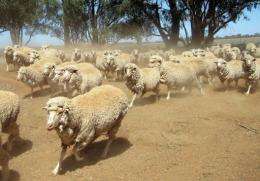Merino sheep search for feed on a dry and dusty property near Parkes in rural New South Wales in January 2010. A drought that has gripped the southwestern corner of Australia since the 1970s is linked with higher snowfall in East Antarctica, a phenomenon that may be rooted in global warming, scientists reported on Sunday.
A drought that has gripped the southwestern corner of Australia since the 1970s is linked with higher snowfall in East Antarctica, a phenomenon that may be rooted in global warming, scientists reported on Sunday.
Researchers Tas van Ommen and Vin Morgan of the Australian Antarctic Division said that the drought -- which has seen winter rainfall decline by 15-20 percent -- is extremely unusual when compared with the last 750 years.
Hand in hand with the drought is a similarly exceptional rise in snowfall at Law Dome, an icecap on the coast of East Antarctica.
The apparent reason is a "precipitation see-saw," the pair report in a paper published online by the journal Nature Geoscience.
Relatively cool, dry air flows northwards to southwest Australia, providing little rain, while warm, moist air flows to East Antarctica, where it provides abundant snow.
The pattern is consistent with previous studies that suggest a man-made role in the drought, say the pair.
Previous research has pointed to greenhouse gases for changing the so-called Southern Annular Model, a key feature of atmospheric circulation in the southern hemisphere.
(c) 2010 AFP





















